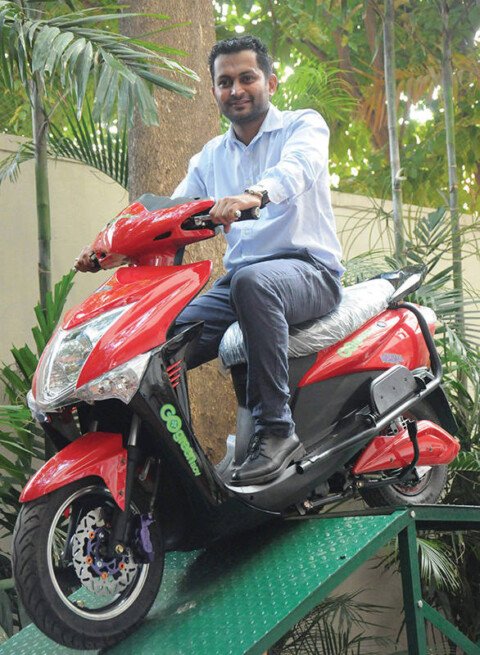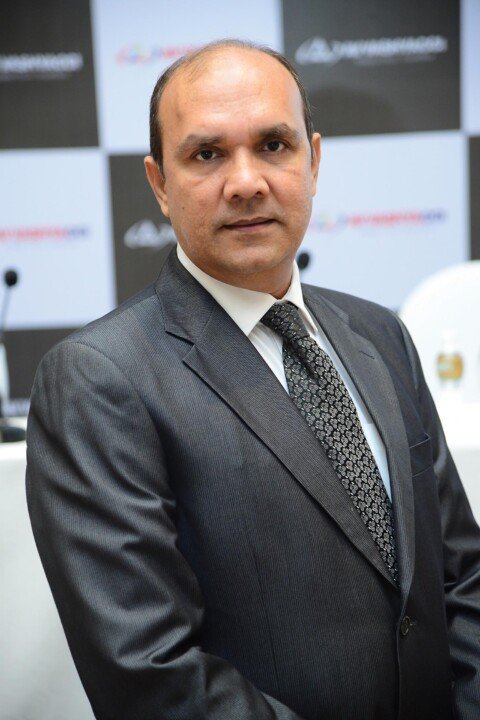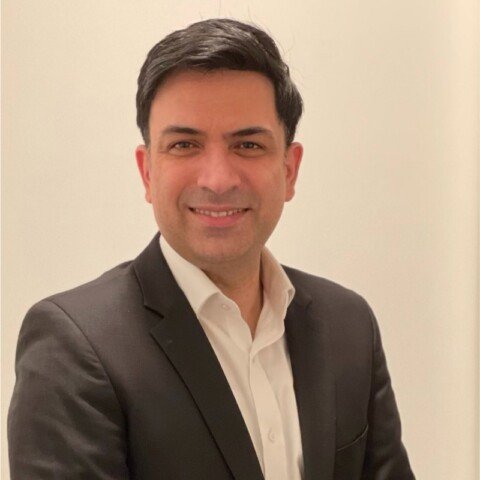In 2008, two leading players in the commercial vehicle business—Volvo Group and Eicher Motors joined hands with a common vision of driving modernisation in the commercial transport business in India. Volvo Group comes with global expertise, leadership in product technology, well-defined processes and a brand that is respected all over the world while Eicher Motors is a leader in light- and medium-sized vehicle segment and brings to the table frugal engineering, considerable after sales infrastructure, and cost-effective operations. Over the year, they have been complementing each other and combining their strengths to deliver effective solutions that favourably impact the finished vehicles ecosystem, meanwhile branding the partnership as Volvo Eicher Commercial Vehicles (VECV). Today, the brand includes a complete range of Eicher-made trucks and buses, exclusive distribution of Volvo Trucks in India, engine manufacturing and exports for Volvo Group, non-automotive engines, and Eicher component business. In an extensive interview, SS Gill, Senior VP & Head- International Business at VE Commercial Vehicles, elaborates on how they have taken the lead in providing the most comprehensive and innovative solution to customers with continuous transformation of infrastructure and technology, while penetrating it presence and product offerings across 34 countries.
How has been the last few year for your company despite the massive downturn in the automotive industry globally? Do you expect growth in the coming years?
If we talk about the international business, we saw peak growth in FY2018-19. Post-that, and before COVID-19, there was definitely a downturn across both domestic and international automotive markets and we did see a drop in the sales of vehicles; however that was lesser than others. For example, Indian auto industry saw a decline of 5 to 10 per cent in the last few years and about 40 per cent in FY2019-20, but Eicher recorded a drop of only 35 per cent. So our drop was in sales was unlike what the overall industry felt.
In the past few months we have seen slight improvement especially in commercial vehicles segment–domestic and international exports witnessed growth. In FY2020-21, we would likely clock about 10 per cent growth over the previous financial year despite COVID-19. The industry is continuing to pick up from the last two quarters and some segments like passenger mobility vehicles has doubled and continuously growing across many markets, both cross and beyond India. Other than that, as long as goods need to be transported, people need essentials, there’s construction and mining work again picking up so lot of sub-segments both within and outside India are doing extremely well.
Kindly elaborate on Eicher’s robust portfolio and wide range of light-duty trucks, heavy-duty haulage trucks and tippers, an exhaustive bus range, etc.
We offer an exclusive range of buses and trucks to our customers. We produce—from 4.9 tonnes to 49 tonnes trucks—5 seater buses to 65 seater buses—even customisable buses with around 80 seats—depending on different configurations. We also have tippers—varying from as small as 4.8 cubic meters and going up to 23 cubic meters. Most importantly, we produce and market vehicles complying with the emission norms set across the world—different countries have different requirements. Hitherto, many of them ask for no exhaust emission norms like Euro 4.
We feel we are capable of supplying up to Euro 6 models, considering we have been supplying base engines required under Euro 6 regulations to the Volvo Group from the last 7 years. When it comes to higher emission norms, we have a wide range that can cater to different market needs, and we are very much capable of providing various emission norms, various types of configurations of trucks, buses, tippers, and even multiple applications that include reefers, concrete mixtures, water tankers and cranes. As such, bearing in mind to the specific requirements of each country, we are quite geared up.
Tell us about the demand for Eicher’s commercial vehicles in different countries. In which foreign markets you see great opportunities and why?
We are currently exporting to over 34 countries across Middle East, Africa, and Asia-Pacific; most recently, we forayed into Latin America.
In different regions, there are specific types of demand or classification of demand. For instance, there’s a huge demand for buses for passenger mobility in the Middle East. Again, say West Africa—almost 50 per cent of the cocoa production happens in Ivory Coast and Ghana—so there is a significant demand for truck trailers for moving agricultural produce or different kinds of food configurations arising out from these regions. We are the market leaders in these regions catering to those vehicle segments—supplying both left and right hand drive vehicles from the last 20 years now. Today, demands are evolving constantly in terms of infrastructure enhancement. And so are we, with new-gen offerings, steaming up the competition with many Japanese brands in Malaysia, Middle East and Latin America.
How would you rate Eicher’s transformation of its IT system backbone and legacy infrastructure across procurement, manufacturing, supply chain logistics?
Weaving intelligence and technology into decision-making capabilities has always been in the DNA of VECV. We were the first automotive company to install world-class ERP system way back in 1999. We believe in productivity and leveraging technology for moving forward. Today, our entire manufacturing set up, supply chain and logistics systems draws heavily on industrial and systems, IT engineering. We have become the first commercial vehicle manufacturer in India to introduce 100 per cent connected trucks and buses with advanced telematics solution across our entire product portfolio, powered by our connected vehicle solution—Eicher LIVE.
With IT and digitalisation, the key is connectivity, and that we already have in place. Therefore, the sense of security in the mind of customers comes from the fact that we are able to connect as well as offer peculiar offerings and experience to suit their businesses. To reach out to customers, specifically—from product development, maximum response in minimum time, ensuring uptime of our trucks and buses—there are many areas where we have leveraged IT tools, helping improve productivity, profitability and customer service. We are adapting to the emerging IT trends for creating advantage for our customers and bring in much more efficiency in manufacturing and inbound and outbound supply chain.
Eicher is credited to carrying out grooming programmes globally to train drivers and technicians. Could you elaborate on the efforts?
We take pride in ensuring the competency build up from day one of signing any contract or putting up a new assembly line. If a latest vehicle model or a new variant of truck or bus is to be introduced, we scale up our teams—technicians, workshop staff, dealerships, service advisors—and train them minutely about the new offering. Many of our international staff also visits our training centres in India. Other way, when it comes to meeting service standards and advisory for the global market, we are able to disseminate the same efficiently. Our chummy partners have set up their training centres across regions where we supply and market our products to train the staff there.
More than that, we use a lot of new-age tools to train our customers and product users. We have world-class award-winning online competency training module portals—Eicher iLearn and Eicher iTube—via which we impart training across countries and in a variety of languages like Arabic, Spanish, German, French, etc. We have trainers who speak multiple languages.
According to you, what kinds of trucks are best suited for the Indian market—considering infrastructure, cost and users?
In most of the Indian haulage operations, about 50 – 55 per cent of the freight operating cost is zero. So the need of the transporter in India is to move goods from one place to another with minimum operating cost. Goods should be able to move faster, while being set on a reliable carrier/truck trailer, enabling the entire business to run smoothly over the long-term. If we summarise, there are three key elements which the Indian road transportation sector desperately needs—lower fuel costs, operational feasibility, and reliable vehicles with lesser maintenanceit must survive the long-run, move fast, make more trips, complemented by smarter technology for visibility and connectivity. That said, VECV’s offerings have not only reduced the operational cost by maximising fuel efficiency but also increased revenue through improved asset utilisation with superior uptime.
VECV has been meeting the key parameters that make up for superior services in the Indian market—fulfiling demands, reaching out to customers to be informed about on-the-ground requirements, and increasing efficiency—apart from and segment-specific benefits such as enhanced logistical efficiency in our vehicles for e-commerce operations and passenger safety in buses. From 2014 onwards, we have introduced the Pro-series trucks and buses, offering better safety, run time and fuel efficiency to our customers. We take pride in offering maximum possible efficiency with savings of up to 10 per cent in fuel costs in many segments.
Over the years, we have taken a significant upturn in the Indian market—our vehicles are far more reliable and efficient than others and secondly, our after-sales service processes are industry-leading. If a customer wants any information at any given time from anywhere, we are able to reach out and respond faster either using IT, manpower network or using after-sales model, something that Volvo group has globally pioneered—we have adopted the same to make sure our buses and trucks are always running on the road. Eicher’s market share continues to increase steadily even as we talk.







